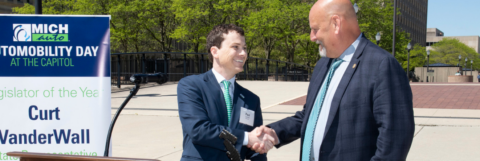Political disagreements are not just a necessity but an essential feature of our democratic society. Despite the dysfunction and paralysis that besets our contemporary political condition, not every cross-aisle deal is high-minded or done for the benefit of the collective citizenry. Therefore, we should champion bipartisanship among our political class not so that everyone can get along; rather, it is because there are some problems that must be solved or principles that must be defended, that are too important to be sacrificed at the altar of partisan or ideological purity.
The problems facing Michigan have been well documented, including the transition from internal combustion engines (ICE) to battery electric vehicles (BEV) is roiling the state’s most important industry and threatening economic dislocation for tens of thousands of workers. In the face of such daunting problems, political stasis brought on by the usual partisan gamesmanship can no longer be dismissed with an apathetic, if well-deserved, roll of the eyes.
The good news is we have a group of lawmakers that understand the inflection point nature that these problems present and are working in good faith to solve them. As MichAuto’s Director of Government and Community Affairs, I feel particularly fortunate that there are legislators from both parties who understand the once-in-a-century shift from ICE to BEV and the challenges and opportunities that shift represents. Legislation like the Strategic Outreach and Attraction Reserve (SOAR) Fund, the SAVE Act, and the prospective R&D Tax Credit are all examples of good policies that have been championed on a bipartisan basis. And while none of this legislation is perfect, it is good. We should remember, as the cliché goes, to never make the two enemies of one another.
Passed in 2016, the SAFE Act has catalyzed tremendous investment in autonomous vehicle technology and start-up activity in Michigan. Passage of SOAR in 2021 has ensured Michigan went from lagging in the battle to win battery manufacturing facilities to being the second largest recipient of such investment in the nation. And when the R&D tax credit legislation is officially made law, it will make Michigan even more competitive and ensure we double down on one of our greatest assets. Not only did these various pieces of legislation receive bipartisan backing, but they also combined both parties’ ideological persuasions: fostering free enterprise by pulling various levers of government.
Among the most important components to spurring such bipartisan policy formulation are groups like the Michigan Auto Caucus and other bipartisan, bicameral groups that bring legislators from both parties together with industry and business stakeholders to exchange ideas and perspectives. Conversations that are started in these forums help bring about stronger, and more politically viable, legislation. Such thoughtful dialogues are not as captivating as the doom-scrolling partisan melees that otherwise divert our attention but should be celebrated and encouraged all the same. MichAuto endeavors to do just that by partnering with the Auto Caucus to facilitate convenings between legislators and industry, bringing our investors to Lansing every spring during our Capitol Day, as we did last Wednesday, and every year recognizing a deserving elected official with our Legislator of the Year award.
It is easy to lose sight of the progress made and the milestones met when we too often interpret such things through a partisan lens, especially during an election year. But it need not be so. My favorite recent example of this happened last year when, after years of working and coming up short, Michigan finally passed a tough but needed distracted driving law. MichAuto was proud to play a part in helping a coalition of Democrats and Republicans rally passage of the law in an overwhelming fashion. Almost one year since it went into effect, the data suggest it’s working, which means it’s saving lives. Years from now, when certain ambitions or ideologies have faded, this commonsense law will still be in effect, making Michiganders on the road safer. And I suspect, still making the bipartisan group of legislators who ensured its passage proud.


